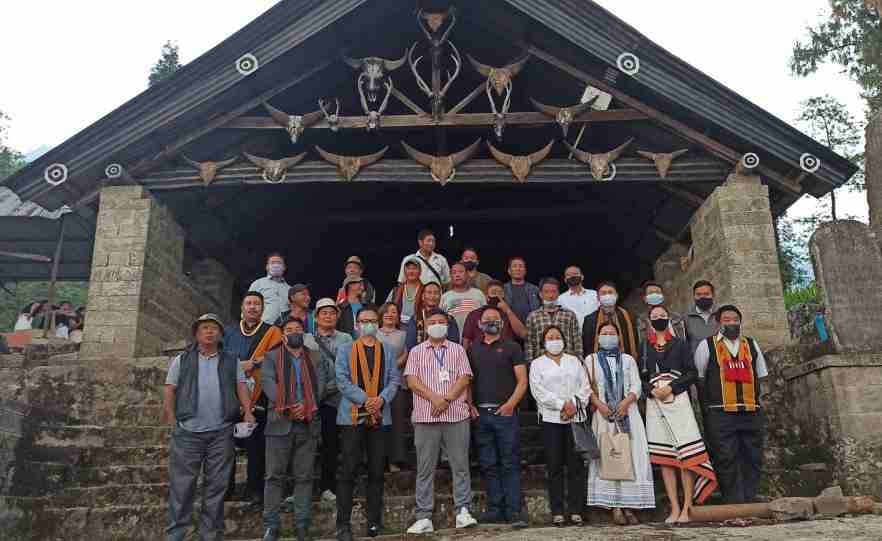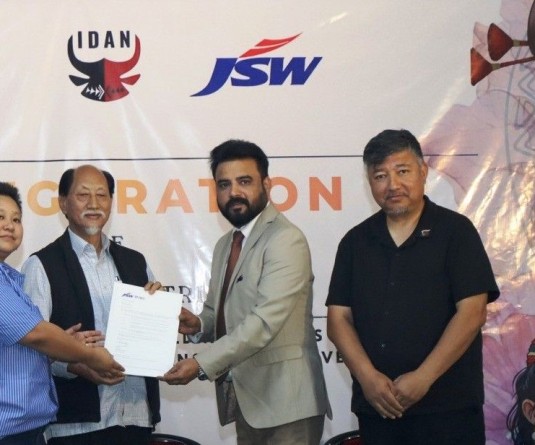Advisor to the Chief Minister of Nagaland, Abu Metha and others at the launching of ‘The Khonoma Experience: Tourism Strategies for the New Millenium’ on May 1. (Morung Photo)

Morung Express News
Kohima | May 1
Three khels from Khonoma namely Dolhuni, Dzüviu and Golato (DDG Kikramia) in the age group of 48-55 initiated ‘The Khonoma Experience: Tourism Strategies for the New Millenium’ on Saturday. 20 years ago, when there was rampant hunting in Khonoma village, the 48-55 Age Group had requested the village council to ban it for at least 6 months. This was one of their first initiatives that eventually led the Council to ban hunting for 12 months.
Over the years, Khonoma village has come to be known for its rich forest reserve and conservation apart from its history, culture, tradition and scenic landscapes. As Advisor to the Chief Minister of Nagaland, Abu Metha further noted, “this village has shaped the history and the journey of the Naga people.” Addressing the event as guest speaker today at Terhotsiese, Khonoma, he also remarked that “the tourism industry today is perhaps the hardest hit industry due to the global pandemic Coronavirus.”
However, amid the dark reality that we are all faced with today, he expressed that “to every dark cloud, there is always a silver lining.” He said this is an opportunity “to strengthen ourselves, introspect, learn from others and prepare for what lies ahead.” Reiterating that it is an opportunity “for us to improve, upscale, add value and be ready for a new world, a changed global environment, a post COVID scenario,” he also highlighted that according to figures released by Times of India, India spends 45 billion dollars in travel alone in a year.
In this regard, he pointed out that Nagaland as a tourism oriented state, focusing on tourism, even if we get 1% of that billion dollar industry, the revenue generated would be Rupees 3350 crores. If this is pumped into tourism industry in Nagaland, he said, “It has the potential to change our lives, and change our economy.”
However, he asserted that in order to get that economy into Nagaland, “we have to realize that we need to put in hard work, make strategic policies, and be ready for that tomorrow, and collectively work to ensure that we get on that bus.” Nagaland also has to decide what is going to be our tourism strategy, what model are we going to take, he added while emphasizing that the real stakeholders of the tourism industry are the local communities, and it must benefit the local communities.
According to figures provided by researchers on the Hornbill Festival, Abu Metha also shared that an investment of rupees 5 crores for Hornbill Festival has generated 106 crores of rupees. “This is the conservative figure of economic impact in Nagaland over a 10-day period by investing 5 crores and 8000+ jobs generated during 10 days,” he said. Emphasizing that tourism industry can succeed and will succeed, he commented, “how much more we can achieve if we can have tourism footfall throughout the year?”
Dwelling on what can Nagaland offer the world, he said, “we cannot offer 5 star hotels, we can’t compete with developed countries and destinations, we can’t offer that.” But he said our strengths lie in “our rich culture, heritage, tradition, beautiful landscapes, rich biodiversity, rolling hills and hospitable people who are ready and tuned to tourism industry.”
With the Government of India also acknowledging that Hornbill Festival is India’s top festival, he said the festival of festivals is the most priceless intellectual property of the Nagas while putting across that every citizen of the state is a stakeholder of the Naga culture and heritage. “We want everybody to benefit. Especially, the local communities must be the highest beneficiaries,” he asserted.
Further, pointing out that the travel industry is also changing in a post pandemic scenario, he said people are now looking for “experiential tourism, for new and safe places where people want to come and stay with local communities/experiences, have conversations, build human relationships.” In this regard, he pointed out that what we need to do immediately is to upscale and upgrade, prepare and be ready.
Naga youths and the younger generation, he said, “cannot miss the bus of the Asian century” while pointing to the strategic location that Nagaland is placed in— “we are the gateway to the east and the west.” “Nagas have to unite, have to remove the challenges, we have to bring in meritocracy, fairness, justice, responsible leadership, then Nagas and the younger generation will not miss the bus. Until and unless we unite, as long as we are fighting among ourselves, that bus will move away,” he also added.
Director of Tourism, Ajanuo Belho remarked that Khonoma village as a top tourist destination has come a long way and with many success stories to share, it can be tagged as one of the model villages for the whole Naga community in promotion of tourism in Nagaland.
In the meantime, she also pointed out that Khonoma has the highest number of tourists visiting the place but Tuophema ranks above Khonoma in revenue generation. “We need to focus in providing more facilities and personalized service with a traditional touch,” she said in this regard.
Stating that Khonoma has a complete package for tourist attraction, she urged focusing on providing better facilities and indulge in activities which can increase the length of stay for a tourist from a day trip to a 7-day-intenerary.
She said that tourism industry is labour intensive having the highest potential for job creation in Nagaland. However, the COVID-19 pandemic has immensely affected the tourism industry and there will be a new post COVID-19 challenge. As per the Tourist Data, she highlighted that the state has a higher proportion of domestic tourist visitors in comparison to foreign tourist which to some extent dampens the negative effect of COVID-19 on tourism.
In this regard, she said strategy in respect of governance, capacity building and infrastructure development and upgradation of tourist facility has been adopted for revival and sustenance of the tourism industry in Nagaland.
Other highlights of the event included welcome by Ngusa Ratsa, Chairman, Khonoma Village Council, invocation by Kevikielie Pierü, Tati Phfe by Phetsukiku Club, Khonoma and vote of thanks by Petevinyü Seyie, President DDG while Kezhasezo Kenneth Punyü was the leader.





